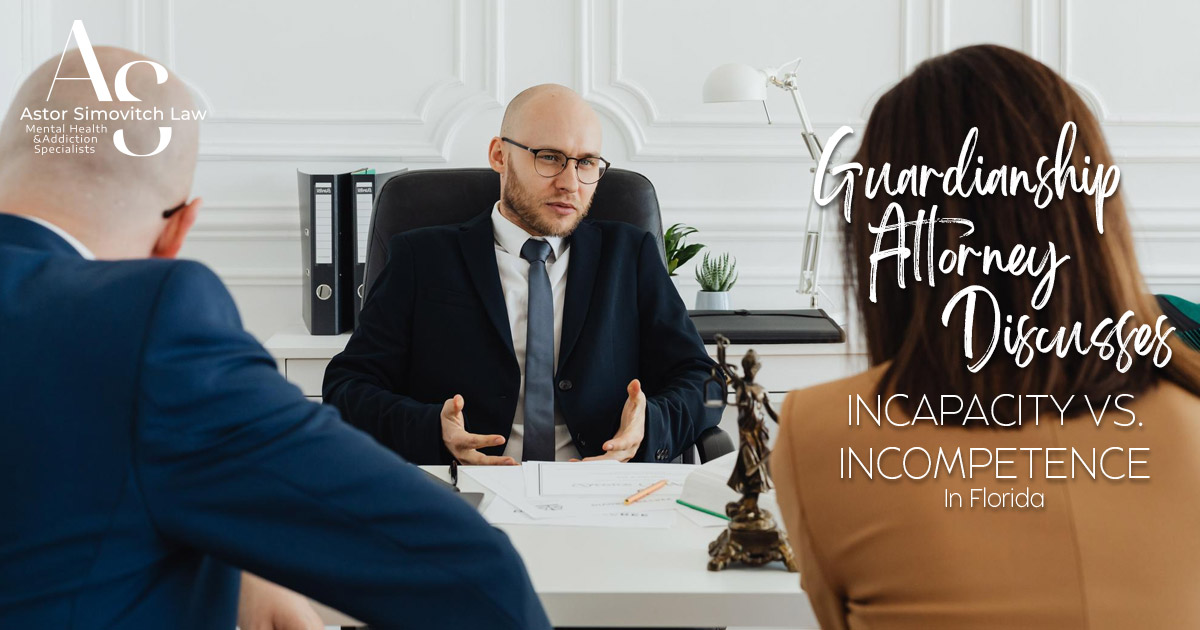Guardianship Attorney Discusses Incapacity vs. Incompetence In Florida

There are numerous instances in which Florida law may require a person’s mental capacity to be assessed. In this article, we take a look at two of these:
- Determination of incapacity in guardianship cases
- Determination of competence in criminal law cases
Although both these determinations relate to a person’s mental functioning and their ability to act in their own interests, they serve very different purposes and should not be confused. While a guardianship attorney can help you to file a petition to determine your loved one’s capacity, they cannot intervene in a criminal court’s determination of someone’s competence.

When Is A Finding Of Competence Relevant?
A core principle of Florida criminal law is that an accused person must be competent (or ‘fit’) to stand trial. This means that they must, at minimum:
- be able to understand the nature and consequences of the criminal charges brought against them;
- be capable of advocating on their own behalf and participating in the preparation of their defense with their legal representatives; and
- demonstrate a rational understanding of the criminal proceedings of which they are the subject.
If a person is made to stand trial while incompetent, this would be a gross violation of their due process rights as enshrined in the Fifth Amendment to the United States Constitution. A criminal defense attorney must raise the issue of competence on behalf of their client should it become apparent that they lack the competence to stand trial.
When Is A Finding Of Incapacity Relevant?
Guardianship attorneys are frequently contacted by those who have confused a finding of incompetence with a finding of incapacity. A court may find a person to be incapacitated in circumstances where a petition for incapacity has been brought by a concerned individual – usually a close relative – who wishes to become the person’s guardian. The finding of incapacity is crucial because it is only when a person is determined to be incapable of looking after themselves and managing their own affairs that a court will appoint a guardian to manage their affairs on their behalf. A guardianship attorney will represent the person seeking appointment as guardian in the proceedings, but in doing so they are also acting in the best interests of the incapacitated person, who will be at risk of harmful neglect if a guardian is not appointed.

How Is Incompetence Determined?
If it becomes apparent at any stage during criminal proceedings that the accused person – formally referred to as the defendant – is unable to understand the nature of the proceedings or assist in the preparation of their defense, a competency hearing will need to be held. Florida law requires that at least two appropriately qualified experts – usually medical doctors with expertise in psychiatric health – must assess the defendant to determine whether they are fit to stand trial. If the defendant is found to be incompetent to proceed to trial, they will be sent to a state facility until they regain competency. This process is often referred to as ‘commitment’, and is not to be confused with involuntary commitment under the Baker Act, which is a civil process in terms of which a severely mentally ill person is taken to a treatment facility to protect them and those around them from harm.
How Is Incapacity Determined?
When a guardianship attorney files a petition for incapacity on behalf of a concerned family member seeking guardianship over their loved one, the court will appoint an examining committee to evaluate the person who is the subject of the guardianship proceedings. The examining committee must have at least three members, who together will examine the AIP (‘alleged incapacitated person’) and prepare a report to the court to help it decide whether guardianship is appropriate. At least one member of the committee must be a psychiatrist or a physician, and the other members may be doctors, physicians, psychiatrists, psychologists, or social workers.
The committee will need to determine whether the AIP is so impaired that they require a guardian to manage their affairs on their behalf. Guardianship appointments may be either temporary or permanent. Guardianship may be terminated at any stage if the person regains their capacity.
Can A Guardianship Attorney Help Me To Have My Loved One Declared Incapacitated?
Incapacity is very different from incompetence. It is important to remember that while a guardianship lawyer can help you to file or defend a petition for incapacity, they cannot become involved in criminal proceedings. Only a criminal defense attorney will have the requisite experience to assist with competency-related proceedings.
If you are worried that your loved one is no longer able to care for themselves, it is strongly recommended that you contact a reputable guardianship attorney as soon as possible to explore your options. There are many different types of guardianship, including adult and minor guardianship, limited and plenary guardianship, and temporary (emergency) and permanent guardianship. In some circumstances, a guardianship order may only be required in respect of the management of your loved one’s property; in others, you may need to be granted authority to make every kind of decision that your loved one would usually have the right to make for themselves. Florida guardianship law is complex and the applicable court procedures can be confusing for a non-specialist to navigate, which is why it is critical that you consult with an experienced guardianship lawyer before filing a petition for incapacity.
A Compassionate Guardianship Attorney You Can Trust
If you’re concerned that your loved one is unable to look after themselves and make decisions in their own interests – whether due to cognitive decline in old age, severe mental illness, disability or injury – the team at Astor Simovitch Law is here to help.
Our experienced guardianship attorneys will help you to determine whether guardianship is a suitable intervention given your loved one’s circumstances, and will take care of all legal filings and documentation that needs to be prepared. With our compassionate support, you’ll be best placed to get your loved one the help they need.
If you have any questions about the guardianship process, contact us today at 561-419-6095 and we’ll gladly be of assistance.